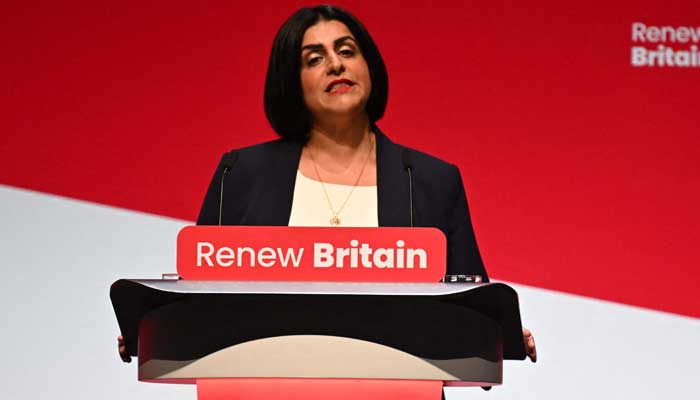Politics
Anti-Muslim hatred in UK at scale never seen before: Home Secretary Sahabana Mahmood

LONDON: British Home Secretary Shabana Mahmood has said that anti-Muslim hatred in the United Kingdom is now “on a scale that I’ve never known in my lifetime”.
Speaking at a Spectator fringe event of the Labour annual conference, hosted by Lord Michael Gove, Mahmood said: “When I was a child, I think I was seven or eight years old, that’s the first time I heard the word “Paki” […] so it’s not as if I haven’t been racially abused before”.
“But what is happening now is something much deeper and much more pervasive, and it does feel like it’s everywhere at the moment. Members of my own family, just in the last couple of weeks, you know, a handful of them have been called “f**** Paki” in Birmingham, in places that I go to regularly with my family,” Mahmood noted.
The “heirs to the skinheads and the Paki-bashers of old” were among those who took to the streets of London for the Unite the Kingdom rally, the home secretary remarked.
“While not everyone chanted racist slogans, some did. Clear that in their view of this country, I have no place,” Mahmood said.
Between 110,000 and 150,000 people turned out for the rally organised by far-right activist Tommy Robinson on September 13, according to the Metropolitan Police.
At the Labour Party conference, Mahmood said that “division within this country will grow” if her party fails to address immigration concerns.
In her speech, the home secretary set out a series of conditions for those seeking indefinite leave to remain status.
Under proposed changes, migrants who want to remain in the UK will have to learn English to a high standard, have a clean criminal record and volunteer in their community.
They will also need to be working, paying national insurance and not be claiming benefits.
Mahmood told the conference: “Just days into this job, on September 13, 150,000 people marched through London. They did so under the banner of a convicted criminal and a former BNP (British National Party) member. While not everyone was violent, some were, 26 police officers were injured as they tried to keep the peace. And while not everyone chanted racist slogans, some did.”
“Clear that in their view of this country, I have no place. It would be easy to dismiss this as nothing but an angry minority, heirs to the skinheads and the Paki-bashers of old, and make no mistake, some were. But to dismiss what happened that day would be to ignore something bigger, something broader, that is happening across this country. The story of who we are is contested.”
Mahmood said, adding that working-class communities will turn away from Labour and “seek solace in the false promises of [Reform UK leader Nigel] Farage” if the Government fails to act on migration concerns.
She further remarked that: “They will turn towards something smaller, something narrower, something less welcoming, and the division within this country will grow”.
“So the challenge we now face is this, not just to win the next election but to keep the country together and to fight for our belief in a greater Britain, not a littler England.”
The home secretary pointed out that “patriotism, a force for good, is turning into something smaller, something more like ethno-nationalism”.
The minister defended the Government’s decision to place conditionality on indefinite leave to remain, arguing it is “right” because it is “a two-way street”, when speaking at a fringe event.
Additionally, Mahmood said: “I think sometimes people might feel that adding conditionality may create two tiers of citizenship, potentially, or it’s asking too much of people. But what I would say is, first, I think it’s right that, as a country, we decide that before you are allowed to remain here for good, there are some things that you have to do”.
“And it’s a two-way street, there’s a reciprocal relationship that’s being created here,” she concluded.